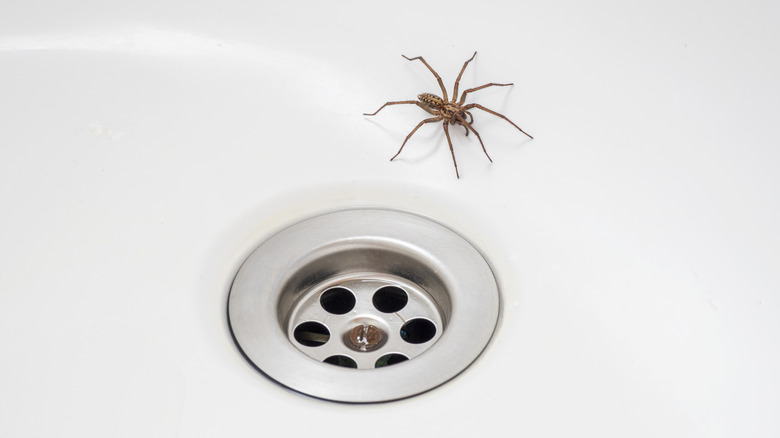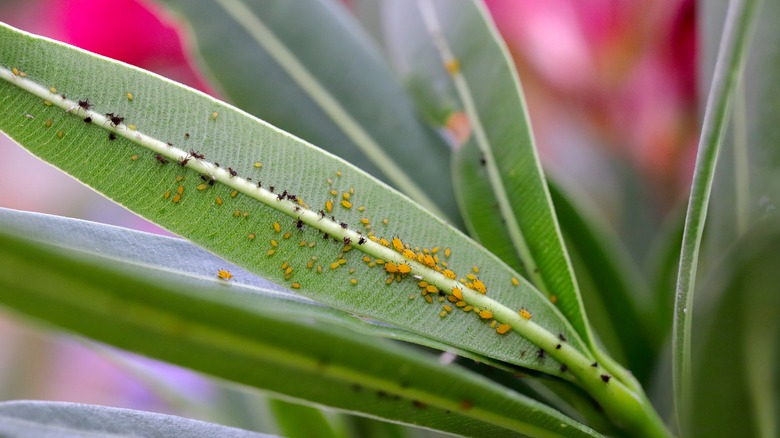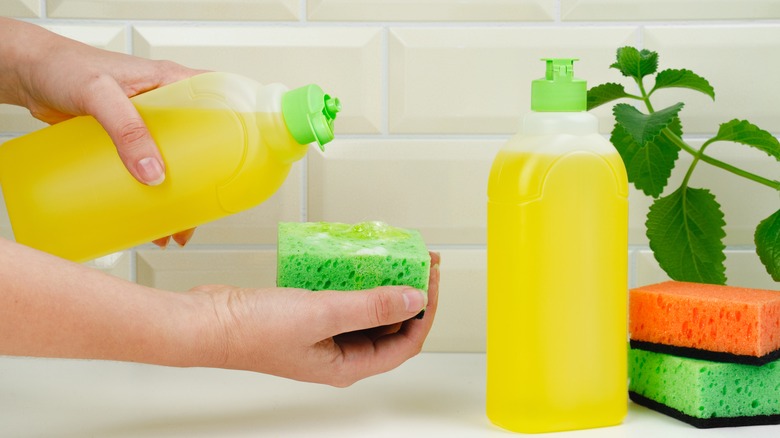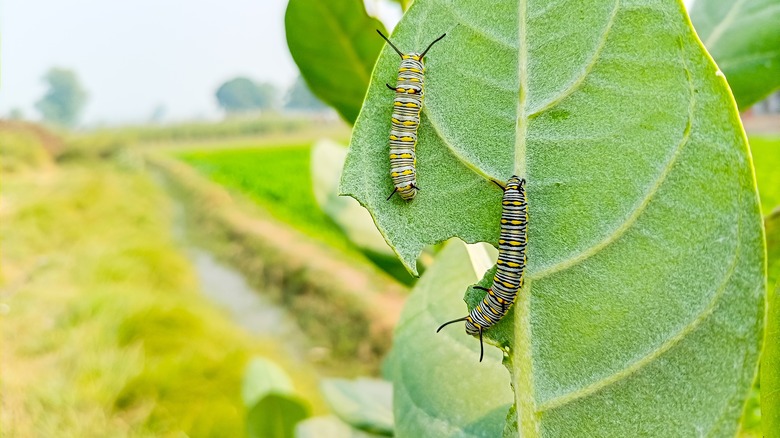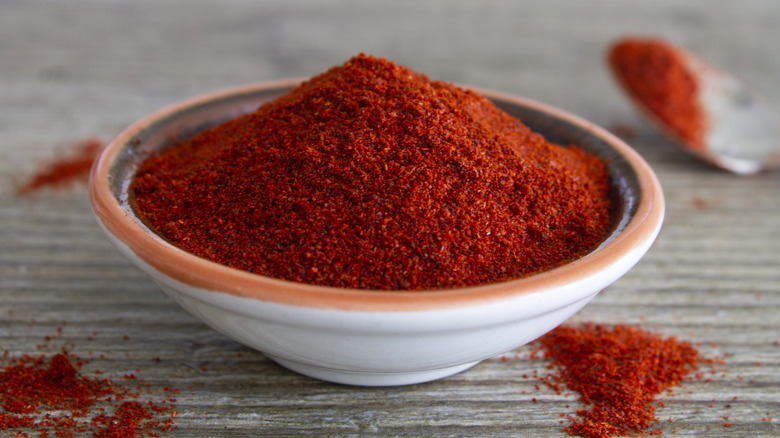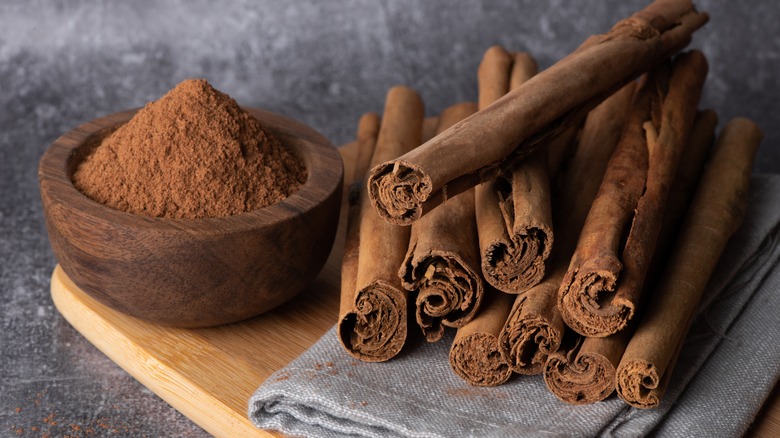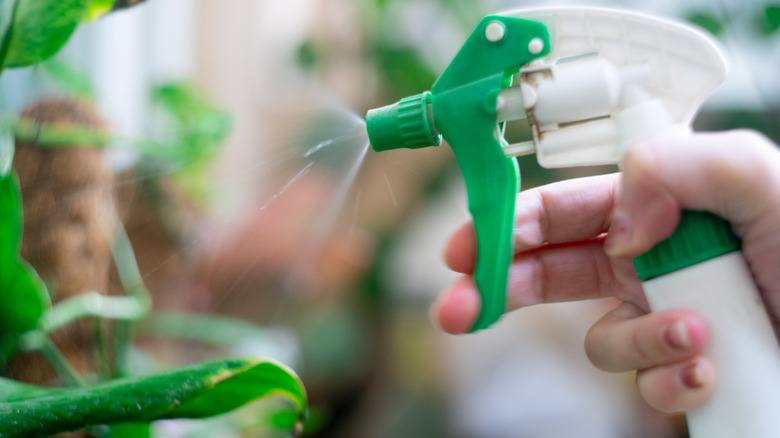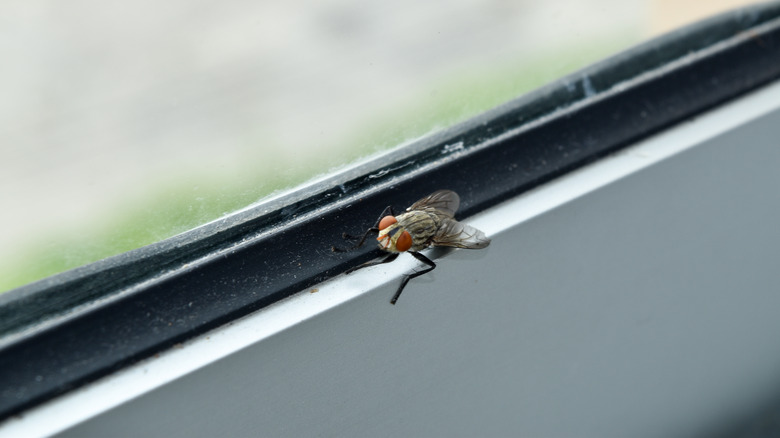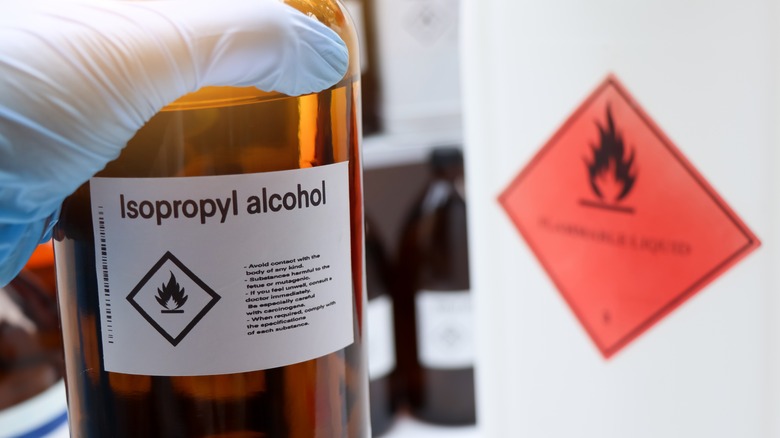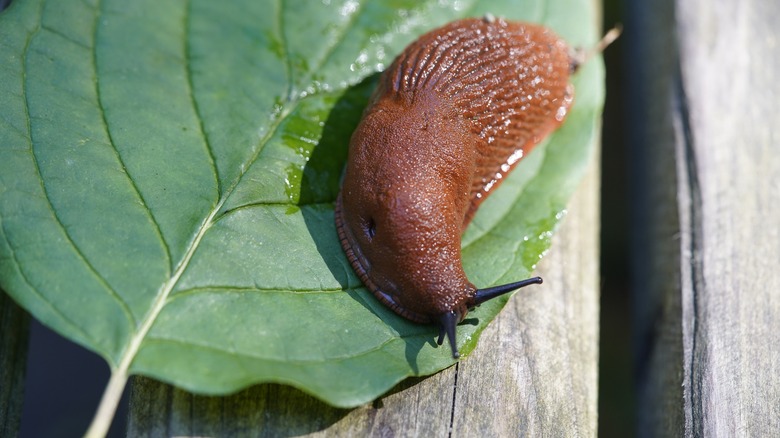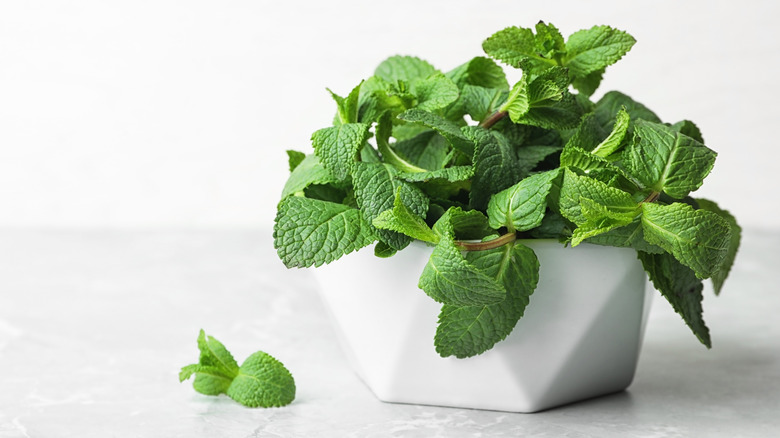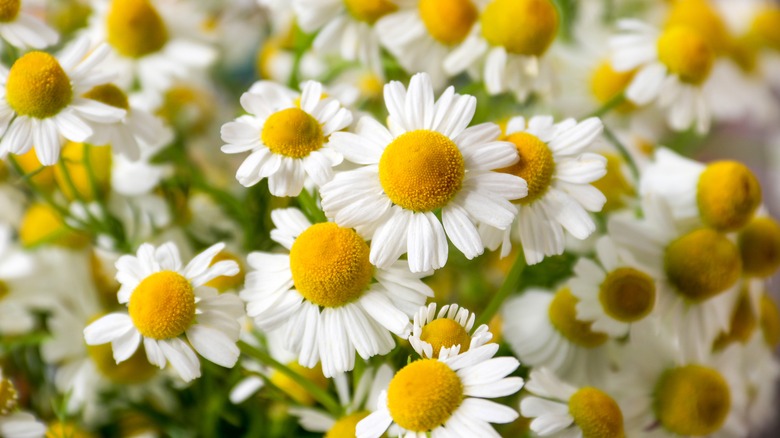Common Kitchen Ingredients You Can Use For DIY Pest Control
Your kitchen has food supplies, herbs, and spices to nourish, sustain, and tickle your taste buds. But some of them pull double duty as pest repellents and exterminators as well. Not all of these homemade pesticide recipes are of the same caliber. Some only repel while others downright kill. Vinegar is a good repellent, while chili pepper is a potent killer. As for beer, it's a trapper that leads hapless victims to their demise.
Some ingredients work on their own, while others work in combination to enhance their lethal powers and target a wider array of pests. Whatever kitchen supplies you use, they all have one thing in common: They're safer alternatives to chemical pesticides. Unlike commercial insecticides, these homemade solutions don't contaminate the soil or pose health risks to the household. Whether you use them around the house or in the garden, the environment will thank you. Here's the lowdown of which ingredients work best against pests, and how to prepare and apply them.
Vegetable oil spray for spider mites, whiteflies, and aphids
The bottle of canola oil, soybean oil, or cottonseed oil in your pantry isn't just for cooking and frying. That vegetable oil is an excellent ingredient for a pest repellent that you can apply to the houseplants and the ornamentals in the garden. Oil is lethal against many insects since it either poisons them or blocks their air passages, thus suffocating them. When it doesn't kill, it acts as a repellent by irritating the bugs and sending them out of the house. Oils can also prevent plant diseases transmitted by pests. Spraying the plants with the oil protects them against infestations. To kill the bugs, make sure the spray coats their bodies thoroughly.
Vegetable oil sprays work well against spider mites, whiteflies, aphids, and scales. The liquid evaporates quickly and doesn't have negative side effects on humans or animals. Nor will the applications affect the beneficial bugs in the garden. However, the spray can leave stains on walls and painted surfaces. Avoid using the oil on wet plants and before rainfall, since moisture prevents the evaporation of the spray. Also, don't apply it when the air temperature is above 100 degrees F or below freezing, to prevent damaging the stressed plants.
Dish soap spray to control thrips, ants, fleas, and grubs
Dish soap is another kitchen ingredient that has good potential as a pesticide alternative. In diluted form, the liquid targets small insects at home and in the garden. Sodium lauryl sulfate, the active ingredient in many dish soaps, is a potent pest control agent. When it comes in contact with soft-bodied bugs, it dissolves the wax coating protecting them, which causes death by dehydration. Dish soap sprays don't harm large insects, so bees, butterflies, and other good bugs in the garden are safe. You only need 1 teaspoon of dish soap mixed into 1 cup of water and shaken well. Fill a spray bottle and apply to the bug infestations. For the best results, spray the pests at close range. This will either kill them or kick them off the plants.
Dish soap sprays are effective against cockroaches, ants, fleas, grubs, leafhoppers, thrips, aphids, mites, and whiteflies, among others. Don't use the dish soap in high concentrations or apply it in temperatures above 90 degrees F or high humidity since it could burn the plants. The spray isn't recommended for plants such as tomatoes, plums, sweet peas, and many turfgrass varieties that are sensitive to the chemicals in the dish soap. When in doubt, test the dish soap on a small part of the plant or the lawn first.
Garlic extract to repel mosquitoes, armyworms, and caterpillars
If you like the smell and flavors of fried garlic, many bugs beg to differ. This kitchen staple has powerful chemical properties that disrupt the daily activities of home and garden pests. Diallyl disulfide and diallyl sulfide are two potent chemicals in garlic with lethal impact on larvae and adult insects alike. While they're not toxic, the compounds interfere with the insects' ability to consume and metabolize food. To prepare the DIY pesticide, drop 6 cloves of garlic, with the skin on, and 4 cups of water in a blender and blend well. Strain the concentrated mixture and keep the liquid in a bottle. To spray pests, fill a spray bottle with 1 part of the garlic extract and 10 parts water. One application remains potent for about 90 hours.
Garlic kills mosquito larvae and repels adult mosquitoes. It's also an effective pest control against flies, cutworms, armyworms, caterpillars, and spider mites. There are no toxic side effects of the extract on humans or animals, and it doesn't harm the plants. However, exposure to the spray might cause eye and nose burns. Don't apply it before rainfall, since the rain will wash it away from the plants.
Chili pepper spray for lace bugs, aphids, and alfalfa weevils
Chili pepper might burn your tongue for a while, but when it comes to bugs, it means business. The veggie is rich in capsaicin, an alkaloid chemical that gives it its spiciness. Insects exposed to capsaicin experience damage to the nervous system and cell membrane. Such damage disrupts the mobility and feeding activities of the bugs and, in some cases, can be lethal. Pests that aren't exposed to the chili spray will avoid the treated area. You'll need 1 tablespoon of chili pepper powder and 3 drops of dish soap mixed into 1/2 gallon of water. Spray the infected plants once every 3 to 5 days.
This natural spray is effective against lace bugs, aphids, spider mites, thrips, alfalfa weevils, and others. Pepper powder is an irritant if it touches the skin or eyes, so always wear eye goggles and gloves before handling it. Another issue with chili pepper is that it kills bees and other pollinators in the garden, so use it with caution. And while it repels deer and other wildlife, it will not keep birds away from your garden.
Cinnamon powder and spray for ants, fungus gnats, and wasps
Cinnamon is more than just a spice to add flavors to soups and desserts. The condiment also contains powerful chemicals, such as cinnamic acid, cinnamyl acetate, and cinnamyl alcohol. Besides their antifungal and antibacterial properties, the compounds are excellent bug repellents. In fact, many common pests don't stand a chance against cinnamon. The strong aromas disorient the bugs or cover the smell of food, which leads the insects astray. To prepare the spray, stir 1 teaspoon of the potent powder in 2 cups of warm water. Let it sit overnight, then strain it. Fill a spray bottle with the liquid and apply it to plants. To combat mosquitoes, spray drains, puddles, and pools regularly.
Cinnamon extracts work against many insects, including ants, fungus gnats, mosquito larvae, thrips, weevils, houseflies, and wasps. Sprinkling the powder around the entry points in the house can keep ants away. If you have dogs, then avoid applying the spice in any form since it's a health hazard. Ingesting the condiment can irritate the skin and mouth of the pet. And if consumed in large quantities, it can lead to low blood pressure and liver diseases.
Vinegar to kill slugs and snails, and repel spiders
The humble vinegar has all the makings of an efficient solution to manage pests. The product of ethanol fermentation, the potent liquid contains acetic acid which has enough intoxicating odors and high acidity to kill and repel many pesky bugs. Since its pH is 2.5, you need to dilute it with water (to dilute the acidity) before applying to furniture and plants. It's also one of the easiest homemade pesticides to prepare. Mix 1 cup of vinegar into 1 cup of water, add 1/2 teaspoon of dish soap, and then stir it well. The dish soap will make the spray stick to plants and surfaces. Repeated applications are required since the spray dries out quickly.
Vinegar can be used to kill snails, slugs, and whitefly eggs, and repel spiders, mosquitoes, ants, and fruit flies. But the acidic liquid has some downsides. Some people find the vinegar odors unpleasant. You could try adding a drop or two of essential oil to the spray to mitigate the acidic smell. And when used as an herbicide, it can burn the leaves of useful plants in the garden.
Essential oils for mosquitoes, ticks, and gnats
The category of essential oils is huge, as they are derived from a wide variety of plants. Besides their health benefits of reducing stress and treating infections, essential oils are also used to control pests. Made by distilling the plants into liquid form, the oils retain the properties of these plants in higher concentrations. Some of the essential oils you can use to manage insects include rosemary, thyme, sage, lavender, citronella, eucalyptus, tea tree, and cedar. To use as repellents, stir 1/4 teaspoon of the oil into 1 cup of water, shake well, then fill a spray bottle. To kill pests, increase the essential oil dose to 1/2 teaspoon in the same recipe. Spray the plants and infected areas once every three days.
Different essential oils target more than one insect species. You can use many oils to repel mosquitoes, ticks, fleas, and flies. Eucalyptus oil is lethal against mites, aphids, and whiteflies, and can repel ants and gnats. As for cedar oil, it's potent against bug larvae, slugs, and roaches, among others. However, use caution when applying these oils around pets. Ingesting the liquid is toxic for both cats and dogs, with symptoms that include vomiting and muscle tremors.
Rubbing alcohol deters bed bugs, mealybugs, and scale
When looking around your pantry for something to manage pest infestations, rubbing alcohol shows up as a suitable candidate. Made of isopropyl alcohol diluted in water, the effects of alcohol on pathogens, fungi, and bacteria are well documented. As for insects, the potent compound liquidates the protective shell of soft-bodied bugs and dries out the rest of the body. But since it contains between 68% to 99% alcohol concentrations, you'll need to dilute it before using it around the house and garden. Mix 1/2 cup of rubbing alcohol and 1/2 teaspoon of dish soap into 2 cups of water and shake well. Spray liberally over the infected areas to make sure the pests are covered with it.
You can use rubbing alcohol to remove these pests from your house: bed bugs, mealybugs, aphids, spider mites, and scale. That said, isopropyl alcohol is toxic when ingested by either humans or animals. It also causes serious damage to plants. If absorbed by the roots, the alcohol causes dehydration, wilting, and death.
Epsom salt for groundhogs, slugs, and beetles
Epsom salt is good for more than a relaxing bath to soothe aching muscles and treat skin issues. It's also indispensable when you have a pest problem. Quite different from table salt, Epsom salt contains magnesium and sulfates. These two compounds are both abrasive and toxic to pests. If they are consumed by rodents or come into contact with the skin of soft-bodied insects, they can be lethal. Epsom salt doesn't need preparation. Sprinkle the granules in small amounts around the plants and pots in the garden to deter pests. Refresh the application when the salt wears off or is washed away.
Epsom salt can be used against groundhogs, slugs, and beetles. The salt is not toxic to bees or other pollinators. But it can cause a lot of damage to the plants. Avoid spraying the foliage with the salty solution since it can lead to leaf scorch. Also, be careful when sprinkling it in the garden. Too much magnesium in the soil could prevent the roots from absorbing calcium, which causes diseases. Additionally, the salt can cause health issues for both cats and dogs if they ingest it in large quantities.
Mint repels ants, flea beetles, and spiders
Whether you grow it in the garden or use leaf extracts, mint is an excellent choice for controlling pests. The aromatic oils in the plant are quite effective at chasing away pests. Mint comes in many varieties, including peppermint, spearmint, and pennyroyal. Each variety has a specific aroma that repels some insects but not others. To prepare the minty spray, add a few fresh mint leaves to 2 cups of water in a pot and bring to a boil. Let it rest overnight, then strain it and fill a spray bottle with the concoction. Spray the infected areas every other day. Alternatively, you can keep a bowl of fresh leaves in the pantry or the kitchen to deter bugs. A third option is to rub the leaves against your skin before you go out on a hike.
Aromatic mint, in general, is quite successful against ants and flea beetles. Meanwhile, peppermint and spearmint repel spiders and mosquitoes. As for pennyroyal, it deters gnats, ticks, flies, and chiggers. But it's also the one variety that can cause health problems for pets. Don't grow or keep the pennyroyal plants where your pets might find them.
Chamomile controls fire ants, moths, and potato beetles
Chamomile tea is more than just a beverage you drink when you're down with the common cold. It also has a potent effect on pests, which is why you should use chamomile tea in your garden. Chamomile contains compounds that act as natural pesticides, such as apigenin, quercetin, rutin, and luteolin. To make the most of the herb, boil a batch of flower heads in water to prepare a strong tea. After it cools down, strain it and fill a spray bottle. You can apply it to pest infestations on plants and soil. Applying the spray to seedlings daily is also recommended as a preventative measure against diseases.
Chamomile tea is effective against moths, fire ants, black bean aphids, pea aphids, and potato beetles. It also has antifungal properties, making it ideal for treating fungal infections such as damping off. The downside of spraying plants with chamomile tea is that it might affect pollinators such as bees and butterflies. And to avoid damaging a heat-stressed plant, apply the treatment either in the morning or in the evening.
Beer to dispose of slugs, roaches, and fruit flies
Beer's appeal extends beyond humans, as the foamy drink charms pests as well. The fermented liquid contains sugar as well as a distinctive odor that many pests find irresistible. You don't need to prepare the beer or mix it with anything, since the beverage has everything you need for pest control. Using it to trap and kill home pests, dip a rag in beer and leave it on the floor in the pantry, kitchen, or garage overnight. Outdoors, you can fill a bowl halfway with the brew and leave it for undesirable garden and lawn critters. Another option is to bury a can half-filled with beer in the ground for pests to drown in the drink.
Beer lures slugs, snails, cockroaches, fruit flies, and rodents. While a rag on the floor will attract roaches from all over the house, trapping slugs only works if the critters are just a few feet away from the trap. To catch as many snails and slugs as you can, it's recommended to place a number of traps in strategic positions in the garden. However, if bees drink from the beer trap, the alcohol might disrupt their daily activities.
